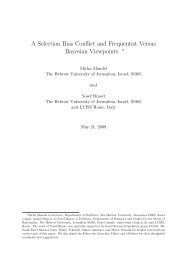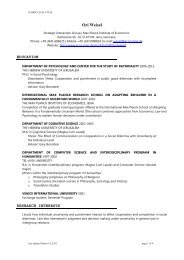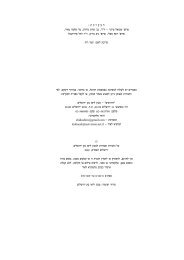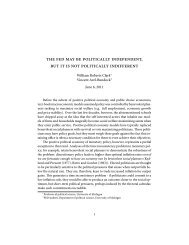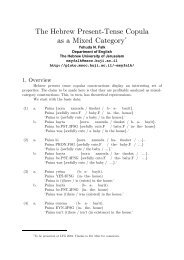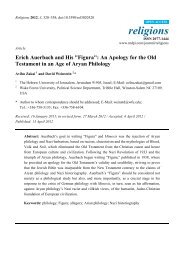Transitive verbs with non-accusative alternation in ... - Pluto Huji Ac Il
Transitive verbs with non-accusative alternation in ... - Pluto Huji Ac Il
Transitive verbs with non-accusative alternation in ... - Pluto Huji Ac Il
Create successful ePaper yourself
Turn your PDF publications into a flip-book with our unique Google optimized e-Paper software.
92<br />
Rivka Halevy<br />
(67) a. English<br />
My guitar broke a str<strong>in</strong>g mid-song<br />
b. German<br />
??Mitten im Lied (zer)riss me<strong>in</strong>e Gitarre e<strong>in</strong>e Saite<br />
middle <strong>in</strong>-song toren my guitar a str<strong>in</strong>g<br />
c. Hebrew<br />
??be-’emtsa ha-šir ha-gitara seli qar’a meitar<br />
<strong>in</strong>-middle of-the-song the guitar m<strong>in</strong>e tore str<strong>in</strong>g<br />
Or, <strong>in</strong> Hebrew, the <strong>in</strong>strument may be expressed as subject <strong>in</strong> comb<strong>in</strong>ation<br />
<strong>with</strong> another verbal lexeme which rejects the <strong>accusative</strong> construal: <strong>in</strong> (68),<br />
e.g., paga’ be- (a pure contact verb) is used <strong>in</strong>stead of hika ‘et/be- ‘hit’ (a<br />
contact through motion verb) which is conf<strong>in</strong>ed <strong>in</strong> its most literal mean<strong>in</strong>g<br />
to proto-agents (viz., human ones):<br />
(68) a. The stick hit the vase<br />
b. ha-maqel paga’ ba-'agartal (??hika 'et/be-)<br />
the-sick hit/touched <strong>in</strong>-the-vase<br />
In both Hebrew and German, transitivity <strong>alternation</strong>, i.e. ‘et/be- <strong>in</strong> Hebrew<br />
and ACC/DAT <strong>in</strong> German, is available only <strong>with</strong> proto-agents, as was<br />
illustrated at the outset of this paper by reference to example (2).<br />
Otherwise, unlike <strong>in</strong> English, the oblique case is used (i.e. the DAT<br />
construction <strong>in</strong> German and the be- construction <strong>in</strong> Hebrew), e.g. (69):<br />
(69) a. Der Regen hat {??mich/mir} <strong>in</strong>s Gesicht geschlagen<br />
(from Draye 1996: 198)<br />
The ra<strong>in</strong> AUX {??me/to-me} on-the face hit<br />
‘The ra<strong>in</strong> hit me <strong>in</strong> the face’<br />
b. ha-gešem hika {??’oti/bi} ba-panim<br />
the-ra<strong>in</strong> hit {??OM-me/ <strong>in</strong>-me} <strong>in</strong>-the-face<br />
‘The ra<strong>in</strong> hit me <strong>in</strong> the face’<br />
Metaphorized read<strong>in</strong>gs also appear to require the presence of the<br />
preposition or the oblique case, e.g. (70):<br />
(70) a. Die Fragen schnieten <strong>in</strong>s Herz<br />
The questions cut <strong>in</strong>-the heart<br />
‘The acute questions engage the attention’<br />
b. ha-še'elot menasrot be-xalal ha-'avir<br />
the-questions cut <strong>in</strong>-space(of) the-air



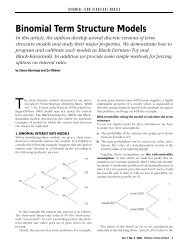
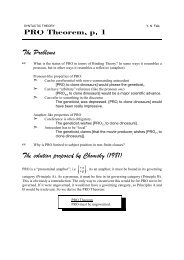
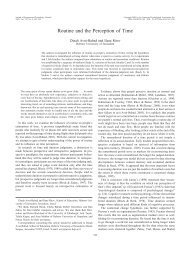
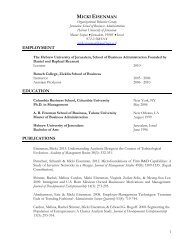
![CV [PDF] - Pluto Huji Ac Il](https://img.yumpu.com/18174585/1/190x245/cv-pdf-pluto-huji-ac-il.jpg?quality=85)
